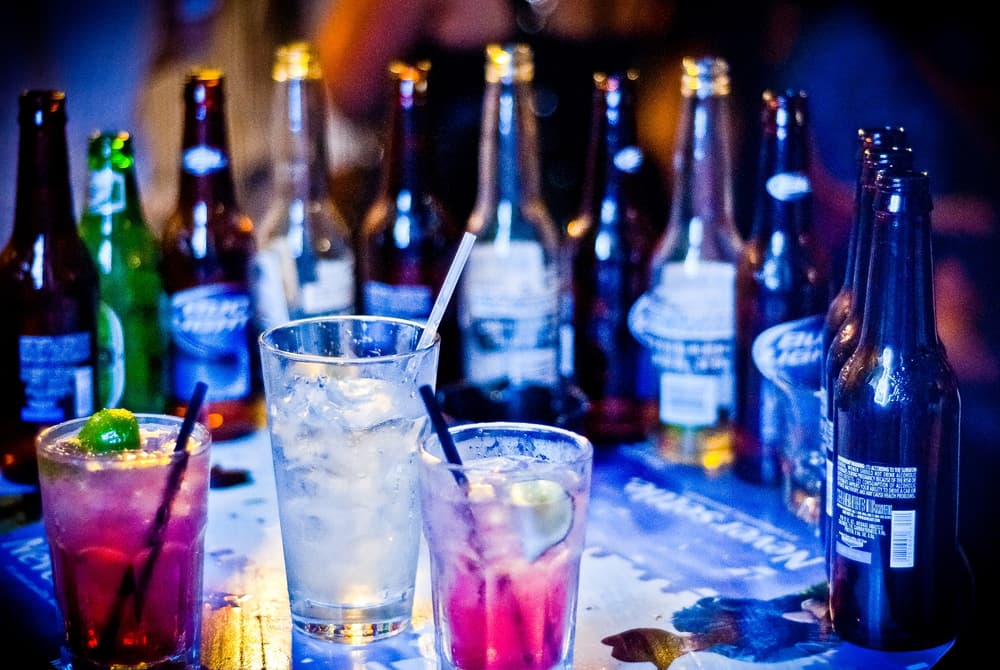Alcohol consumption is climbing at a faster rate on Vancouver Island than in other regions in B.C., according to the Centre for Addictions Research of B.C. at UVic.
Centre director Tim Stockwell suggests the Island’s higher rate, measured between 2002 and 2009, was fuelled by strong economic conditions prior to the recession, and by the growth of private liquor stores.
The amount of alcohol consumed is heavily influenced by price and physical availability, he said.
“As a community, we need to make decisions how we regulate this product because it is not like other products. It is not like milk and orange juice.”
The centre carries out research and education on substance abuse, harm reduction and addiction. It was founded because of provincial concerns about health and social problems resulting from alcohol, drugs and tobacco in B.C. Alcohol has been linked to a wide range of medical issues.
The centre released a January study saying that alcohol-related deaths and alcohol consumption seem to be rising in B.C. as the number of private liquor stores have increased. From 2003 and 2008, the number of government liquor stores slid to 199 from 222, while private store numbers rose to 977 from 727.
The number of alcoholrelated deaths grew to 2,011 in 2008, from 1,937 in 2003. More than 20,000 hospital admissions in B.C. in 2009 were alcohol-related, according to data from the centre.
“I think local municipalities need to take a long, hard look at policies around the number of liquor outlets they have and where they are placed.”
The Island’s per capita consumption, for people 15 years old and up, climbed by 23 per cent between 2002 and 2009. In 2009, the per capita amount of alcohol consumed was 10.7 litres, up from 8.68 litres in 2002. One litre of alcohol is equal to 58 standard drinks, the centre said. That puts the Island rate at 620.9 drinks for the year.
“There are a lot of people drinking much lower [amounts],” while others consume far more, Stockwell said Saturday.
Within our population, 10 per cent of the people are responsible for drinking 50 per cent of the alcohol, he said. B.C.’s Interior region followed with an increase of 17.7 per cent, the Fraser Valley rose by 11.45 per cent, Vancouver-Coastal area by 9.84 per cent and Northern B.C. by 9.8 per cent.
The centre collects data from the B.C. Liquor Distribution Branch, Statistics Canada, U-Brew and U-Vin sales and its own analysis of alcohol content in products. Consumption could also reflect, in part, drinking by tourists, Stockwell said.
While consumption climbed in all regions of B.C., numbers also showed a drop in consumption between 2008 and 2009. Data from 2010 are being analyzed now, Stockwell said.
Dr. John Copen, Vancouver Island Health Authority’s chief for psychiatry for the South Island, has not seen the centre’s study but said when it comes to alcohol, “I think there’s a problem, pretty much North American-wide.”
“Alcohol has major impacts on almost every body system … When any intoxication occurs if you have a mental health issue, oftentimes your reasons for not acting go down and you become impulsive, it increases the risk of suicide, of homicide, pretty much anything violent.”
He pointed to the U.S. National Institute of Drug Abuse (www.nida.nih.gov /infofacts/lessons.html), which lists lessons from research, including the importance of parental support and involvement, and early intervention for those at risk.
Randy Wilson, co-owner of Liquor Plus stores on Vancouver Island, questions Stockwell’s conclusions, saying data being compared are too narrow, and more factors need to be included.
He takes issue with Stockwell’s thoughts on the impact of price and availability. Washington State and California are among jurisdictions with similar rates of alcohol-related accident deaths but prices in those states are far lower – B.C. has a higher tax level – and alcohol is sold in a wider variety of outlets.
Also, sales to restaurants, for example, do not necessarily reflect consumption because wine may be part of inventory and not sold, Wilson said.
Higher alcohol consumption in B.C. and on the Island could have been connected to a booming economy, Wilson said, noting that many workers came to this province to work on development projects.
“I like liquor laws being tight. We do sell a controlled substance.” But only a small percentage of the population has addition issues, Wilson said. “We don’t want to tar the 97 per cent of the people who drink responsibly.” cjwilson@timescolonist.com
© Copyright (c) The Victoria Times Colonist
By Carla Wilson, Times Colonist

